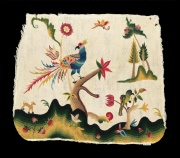Difference between revisions of "Fustian"
Jump to navigation
Jump to search
(username removed) |
|||
| (3 intermediate revisions by 3 users not shown) | |||
| Line 1: | Line 1: | ||
| − | [[File:19.602-SC54391.jpg|thumb| | + | [[File:19.602-SC54391.jpg|thumb|Chair seat<br>MFA Acc. #: 19.602]] |
== Description == | == Description == | ||
| − | A sturdy, short-pile fabric originally made from [ | + | A sturdy, short-pile fabric originally made from [[cotton]] weft and [[linen]] warp using a satin weave. Fustian was popular during the Middle ages and probably orginated in Al-Fustat (Egypt) about 200 CE. It has a smooth twill surface on one side and a short, heavy-napped surface on the other. Fustian is used for sportswear and work clothing and, at one time, was used for covering blankbooks. Since the 19th century, cotton has been used for both the warp and weft. |
== Synonyms and Related Terms == | == Synonyms and Related Terms == | ||
| Line 8: | Line 8: | ||
moleskin; velveteen; corduroy | moleskin; velveteen; corduroy | ||
| − | == | + | == Resources and Citations == |
| − | * | + | * G.S.Brady, ''Materials Handbook'', McGraw-Hill Book Co., New York, 1971 Comment: p. 846 |
| − | * | + | * Matt Roberts, Don Etherington, ''Bookbinding and the Conservation of Books: a Dictionary of Descriptive Terminology'', U.S. Government Printing Office, Washington DC, 1982 |
| − | * ''Encyclopedia Britannica'', http://www.britannica.com Comment: "Fustian." | + | * ''Encyclopedia Britannica'', http://www.britannica.com Comment: "Fustian." Accessed 30 July 2004 . |
| − | * Wikipedia | + | * Wikipedia: http://en.wikipedia.org/wiki/Fustian (Accessed Nov. 2, 2005) |
| − | * | + | * Random House, ''Webster's Encyclopedic Unabridged Dictionary of the English Language'', Grammercy Book, New York, 1997 |
* ''The American Heritage Dictionary'' or ''Encarta'', via Microsoft Bookshelf 98, Microsoft Corp., 1998 | * ''The American Heritage Dictionary'' or ''Encarta'', via Microsoft Bookshelf 98, Microsoft Corp., 1998 | ||
Latest revision as of 09:07, 17 August 2020
Description
A sturdy, short-pile fabric originally made from Cotton weft and Linen warp using a satin weave. Fustian was popular during the Middle ages and probably orginated in Al-Fustat (Egypt) about 200 CE. It has a smooth twill surface on one side and a short, heavy-napped surface on the other. Fustian is used for sportswear and work clothing and, at one time, was used for covering blankbooks. Since the 19th century, cotton has been used for both the warp and weft.
Synonyms and Related Terms
moleskin; velveteen; corduroy
Resources and Citations
- G.S.Brady, Materials Handbook, McGraw-Hill Book Co., New York, 1971 Comment: p. 846
- Matt Roberts, Don Etherington, Bookbinding and the Conservation of Books: a Dictionary of Descriptive Terminology, U.S. Government Printing Office, Washington DC, 1982
- Encyclopedia Britannica, http://www.britannica.com Comment: "Fustian." Accessed 30 July 2004 .
- Wikipedia: http://en.wikipedia.org/wiki/Fustian (Accessed Nov. 2, 2005)
- Random House, Webster's Encyclopedic Unabridged Dictionary of the English Language, Grammercy Book, New York, 1997
- The American Heritage Dictionary or Encarta, via Microsoft Bookshelf 98, Microsoft Corp., 1998
- Art and Architecture Thesaurus Online, http://www.getty.edu/research/tools/vocabulary/aat/, J. Paul Getty Trust, Los Angeles, 2000
